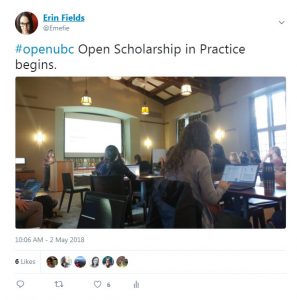 During the 2018 Open Scholarship in Practice Symposium, held May 2 in the Irving K. Barber Learning Center, scholars from across UBC spoke to the current progress – and intimated the future possibilities – of open knowledge initiatives on campus.
During the 2018 Open Scholarship in Practice Symposium, held May 2 in the Irving K. Barber Learning Center, scholars from across UBC spoke to the current progress – and intimated the future possibilities – of open knowledge initiatives on campus.
The morning keynote panelists took turns describing the respective roles researchers, instructors, and librarians play in building an environment where open scholarship can flourish. UBC Vice Provost and Associate Vice President Academic Eric Eich, and UBC Okanagan Associate Professor of Biology Jason Pither began by illustrating how open scholarship can generate a culture of transparency and accountability in scientific work. They outlined specific steps being taken to equip UBC researchers and students with open science tools and approaches, including engraining open science methods into science curriculum.
Next, Simon Bates, the Academic Director for UBC’s Centre for Teaching, Learning, and Technology, shared a personal narrative of his own experiences with open pedagogy, including design principles for open resources and development of open pedagogical tools that give students a greater sense of scholarly agency.
Closing the session, Scholarly Communications and Copyright Librarian Leonora Crema described how the current academic publishing business sequesters “knowledge capital,” creating barriers to scholarly exchange, hampering efforts at knowledge mobilization, and perpetuating “a straining, if not broken, knowledge ecosystem.” To counter this, Crema said, universities must promote alternatives to traditional modes of scholarship – new ways of rewarding, disseminating, and publishing academic work.
The seminars, lightning talks, and workshops that followed focused on just that. Research Data Services Librarian Eugene Barsky outlined how UBC is mobilizing in advance of Canada Tri-Agency’s soon-to-be-implemented Digital Data Management requirements, which will require recipients of grant money to deposit their research data in Tri-Agency-approved repositories. Meanwhile, BCcampus Open Education Advisor Lucas Wright and UBC Library Flexible Learning Coordinator Erin Fields introduced the vocabulary and methods instructors can use to begin applying principles of open scholarship in the university classroom. In a concurrent session, Statistics Instructor Tiffany Timbers demonstrated how data science platform GitHub can be used to simplify workflows for both UBC students and instructors.
Afternoon sessions began with a series of lightning talks from UBC faculty members David Gaertner, Claudia Krebs, Janelle Bulkan, Siobhan McPhee, Jon Festinger, Gill Green, and Mark Turin, all of whom are undertaking innovative open scholarship initiatives in their respective disciplines. The session, moderated by Christina Hendricks, was remarkable for the diversity of approaches and technologies being used, and made it clear that an open scholarship movement is emerging on campus.
The day concluded with several hands-on workshops demonstrating the basic capabilities of three different open platforms:
- Open Science Framework, a web-based research management platform from the Center for Open Science (co-presented by Jason Pither and UBC Okanagan Open Scholarship Librarian Mathew Vis-Dunbar),
- WeBWork, an web-based homework grading system (co-presented by UBC Engineering Instructors/Teaching Fellows Agnes d’Entremont, Jonathan Verrett, Luis Linares, and Negar Harandi),
- and Pressbooks, a WordPress-based textbook formatting and publishing platform (co-presented by Leonora Crema, Erin Fields, Lucas Wright, and UBC Scholarly Communications Graduate Academic Assistant Zachary Foote).
Watch the Open UBC site for future open scholarship events and training seminars. We especially welcome ideas for sessions or reports on new initiatives from across the UBC academic community.
For presentations and resources from this event, go to cIRcle, UBC Library’s Institutional Repository.
